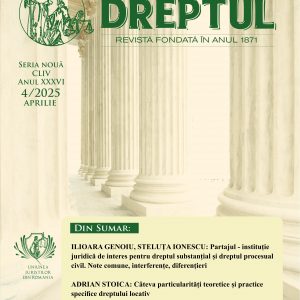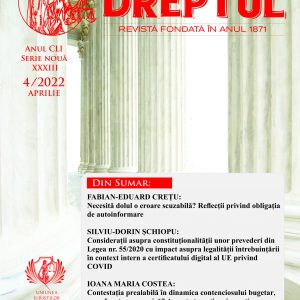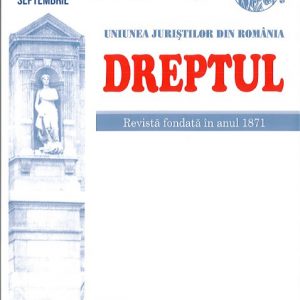-

-
 Au fost analizate mai multe situaþii în care pedepsele aplicate inculpaþilor trebuiau sã fie descontopite în individualitatea lor pentru fapte concurente ºi apoi aplicarea procedeului judiciar de contopire din nou a acestora cu pedeapsa ce se aplicã în cauza dedusã judecãþii, potrivit dispoziþiilor art. 36 alin. (1) C.pen. Contopirea din nou a pedepselor se referã atât la pedepse integrale aplicate, cât ºi la fracþiunile acestora rãmase neexecutate, ceea ce poate conduce la revocarea ºi contopirea unor resturi de pedeapsã care au mai fost revocate ºi contopite în noua pedeapsã (cu notã criticã).
Au fost analizate mai multe situaþii în care pedepsele aplicate inculpaþilor trebuiau sã fie descontopite în individualitatea lor pentru fapte concurente ºi apoi aplicarea procedeului judiciar de contopire din nou a acestora cu pedeapsa ce se aplicã în cauza dedusã judecãþii, potrivit dispoziþiilor art. 36 alin. (1) C.pen. Contopirea din nou a pedepselor se referã atât la pedepse integrale aplicate, cât ºi la fracþiunile acestora rãmase neexecutate, ceea ce poate conduce la revocarea ºi contopirea unor resturi de pedeapsã care au mai fost revocate ºi contopite în noua pedeapsã (cu notã criticã). -
 This study raises for discussion the condition of full recognition of facts and changing the legal classification within the trial procedure in case of recognition of accusation. A deed, which the defendant must recognize, means the act of conduct committed under both its sides, objective and subjective, as well as all the circumstances surrounding this act, regardless of their nature and of the moment when they occur in relation to the act itself. The defendant may contest the legal classification established by the public prosecutor and may benefit from the settlement of the case in simplified procedure only when the contestation against the legal classification is not based on a change of the state of facts.
This study raises for discussion the condition of full recognition of facts and changing the legal classification within the trial procedure in case of recognition of accusation. A deed, which the defendant must recognize, means the act of conduct committed under both its sides, objective and subjective, as well as all the circumstances surrounding this act, regardless of their nature and of the moment when they occur in relation to the act itself. The defendant may contest the legal classification established by the public prosecutor and may benefit from the settlement of the case in simplified procedure only when the contestation against the legal classification is not based on a change of the state of facts. -
 In this study, the author presents some aspects of the problems of proving with witnesses of the own assets, in the relations between spouses, over three periods of the legislative evolution in Romania: the period from 1 February 1954, when the Family Code entered into force, to 1 October 2011, when the new Civil Code entered into force; the period from the entry into force of the new Civil Code and 15 February 2013 (the date when the new Civil Procedure Code entered into force); the period that began on 15 February 2013, when the new Civil Procedure Code entered into force, a date since when the matter of proving the own assets in the relations between spouses is governed by the new Civil Code and by the new Civil Procedure Code. In this part of the study the author notes that Article 316 of the new Civil Procedure Code contains a wording likely to generate divergent case law concerning the proof with witnesses of the own assets in the relations between spouses. The author argues the opinion that, from 15 February 2013 as well, the proof of the own assets in the relations between spouses can be given by any means of evidence, including the proof with witnesses, which, however, in case of the opposition from one of the spouses, can not be relatives and in-laws in rank prohibited by law. In this context, the author makes a de lege ferenda proposal for the amendment of the content of Article 316 of the new Civil Procedure Code, in order to prevent the emergence of a non-unitary case law. The proposal is to replace the phrase and other family relations with the phrase and other similar family relations.
In this study, the author presents some aspects of the problems of proving with witnesses of the own assets, in the relations between spouses, over three periods of the legislative evolution in Romania: the period from 1 February 1954, when the Family Code entered into force, to 1 October 2011, when the new Civil Code entered into force; the period from the entry into force of the new Civil Code and 15 February 2013 (the date when the new Civil Procedure Code entered into force); the period that began on 15 February 2013, when the new Civil Procedure Code entered into force, a date since when the matter of proving the own assets in the relations between spouses is governed by the new Civil Code and by the new Civil Procedure Code. In this part of the study the author notes that Article 316 of the new Civil Procedure Code contains a wording likely to generate divergent case law concerning the proof with witnesses of the own assets in the relations between spouses. The author argues the opinion that, from 15 February 2013 as well, the proof of the own assets in the relations between spouses can be given by any means of evidence, including the proof with witnesses, which, however, in case of the opposition from one of the spouses, can not be relatives and in-laws in rank prohibited by law. In this context, the author makes a de lege ferenda proposal for the amendment of the content of Article 316 of the new Civil Procedure Code, in order to prevent the emergence of a non-unitary case law. The proposal is to replace the phrase and other family relations with the phrase and other similar family relations. -
 The continuation of the criminal trial is a form of exercising the right of defence through which, in the cases expressly and limitingly provided by law, the suspect or defendant causes an increase in procedural activity after extinguishing the criminal action in order to unequivocally establish his innocence. This procedure, which is the subject of this study, was established to guarantee the presumption of innocence of the suspect or defendant in the event that the criminal action is extinguished as a result of certain impediments provided by Article 16 of the Criminal Procedure Code. These impediments are: the existence of a cause of imputability, the intervention of the pre-conviction amnesty, the intervention of the prescription of criminal liability, the withdrawal of the preliminary complaint and the existence of a cause of impunity. These situations are limited.
The continuation of the criminal trial is a form of exercising the right of defence through which, in the cases expressly and limitingly provided by law, the suspect or defendant causes an increase in procedural activity after extinguishing the criminal action in order to unequivocally establish his innocence. This procedure, which is the subject of this study, was established to guarantee the presumption of innocence of the suspect or defendant in the event that the criminal action is extinguished as a result of certain impediments provided by Article 16 of the Criminal Procedure Code. These impediments are: the existence of a cause of imputability, the intervention of the pre-conviction amnesty, the intervention of the prescription of criminal liability, the withdrawal of the preliminary complaint and the existence of a cause of impunity. These situations are limited. -
 Conform art. 4251 alin. (1) C.pr.pen., calea de atac a contestației se poate exercita numai atunci când legea o prevede expres. Cu toate că dispozițiile art. 278 C.pr.pen. care constituie sediul materiei îndreptării erorilor materiale nu prevăd posibilitatea atacării încheierii cu cale de atac separată, sunt incidente dispozițiile art. 442 și 446 C.pr.civ. prin mijlocirea art. 2 alin. (2) din același act normativ, Codul de procedură civilă, prin generala sa aplicabilitate, reprezentând dreptul comun și în materie procesual penală. Drept urmare, atâta vreme cât legea procesual penală nu interzice expres posibilitatea atacării încheierilor de îndreptare a erorilor materiale pe cale separată, se poate apela la dispozițiile legii procesual civile care reglementează această posibilitate (cu notă critică).
Conform art. 4251 alin. (1) C.pr.pen., calea de atac a contestației se poate exercita numai atunci când legea o prevede expres. Cu toate că dispozițiile art. 278 C.pr.pen. care constituie sediul materiei îndreptării erorilor materiale nu prevăd posibilitatea atacării încheierii cu cale de atac separată, sunt incidente dispozițiile art. 442 și 446 C.pr.civ. prin mijlocirea art. 2 alin. (2) din același act normativ, Codul de procedură civilă, prin generala sa aplicabilitate, reprezentând dreptul comun și în materie procesual penală. Drept urmare, atâta vreme cât legea procesual penală nu interzice expres posibilitatea atacării încheierilor de îndreptare a erorilor materiale pe cale separată, se poate apela la dispozițiile legii procesual civile care reglementează această posibilitate (cu notă critică). -

-

-
 The financial law relations are relevant in the extended dynamics of the public law, as a reflection of the importance of public financial resources and of the technicality of the legal elements in the budgetary procedures. This study positions, in this context, a traditional institution, namely the preliminary procedure, as a space for the manifestation of the dynamics and points of tension deriving from legal conflict relations revealed as a result of the audit missions of the Court of Accounts. The analytical approach organized in a spectrum from general to special highlights the working hypotheses, the functions, the object and the finalities of the preliminary procedure in the matter of budgetary law relations.
The financial law relations are relevant in the extended dynamics of the public law, as a reflection of the importance of public financial resources and of the technicality of the legal elements in the budgetary procedures. This study positions, in this context, a traditional institution, namely the preliminary procedure, as a space for the manifestation of the dynamics and points of tension deriving from legal conflict relations revealed as a result of the audit missions of the Court of Accounts. The analytical approach organized in a spectrum from general to special highlights the working hypotheses, the functions, the object and the finalities of the preliminary procedure in the matter of budgetary law relations. -
 The present study analyzes the working hypotheses in the matter of the preliminary procedure regarding claims from European funds. The study identifies a number of working scenarios, starting from the particular way in which these claims arise, specific to European funding mechanisms. Another filter in the analysis is given by an irregularity in the management of funding, an irregularity that is treated differently as it appears before or after the payment, taking into account the variable, if it generates a debt to be recovered from the European Union budget/international public donors and/or national public funds related to them through an undue payment. Thus, the study observes a series of nuances in the hypothesis of undue payments, similar shades of contentious type to tax procedures1.
The present study analyzes the working hypotheses in the matter of the preliminary procedure regarding claims from European funds. The study identifies a number of working scenarios, starting from the particular way in which these claims arise, specific to European funding mechanisms. Another filter in the analysis is given by an irregularity in the management of funding, an irregularity that is treated differently as it appears before or after the payment, taking into account the variable, if it generates a debt to be recovered from the European Union budget/international public donors and/or national public funds related to them through an undue payment. Thus, the study observes a series of nuances in the hypothesis of undue payments, similar shades of contentious type to tax procedures1. -
 In this study we intend to make an analysis of the contestation to the insolvency condition, namely the processual means that may be used by the debtor against whom an application for opening the insolvency procedure has been filed. In the light of a rich judicial practice in this area, we consider it appropriate to compare the legal provisions found in Article 72 of the Law No 85/2014, as amended and supplemented, with the jurisprudential interpretations, in order to better understand this means of defence made available to the debtor by the legislator. Thus, we will observe the nature and the conditions in which the debtor’s right to contestation may be exercised, the reasons which can be invoked and the evidence that he can use to demonstrate the lawfulness of his contestation, as well as the legal effects and consequences determined by this procedure.
In this study we intend to make an analysis of the contestation to the insolvency condition, namely the processual means that may be used by the debtor against whom an application for opening the insolvency procedure has been filed. In the light of a rich judicial practice in this area, we consider it appropriate to compare the legal provisions found in Article 72 of the Law No 85/2014, as amended and supplemented, with the jurisprudential interpretations, in order to better understand this means of defence made available to the debtor by the legislator. Thus, we will observe the nature and the conditions in which the debtor’s right to contestation may be exercised, the reasons which can be invoked and the evidence that he can use to demonstrate the lawfulness of his contestation, as well as the legal effects and consequences determined by this procedure. -
 The author advocates for expanding the admissibility of the special contestation for annulment and for eliminating the errors of judgment, i.e. for the non-compliance with the legal provisions and the incorrect assessment of the factual situations (illegality and groundlessness of the judgments challenged). In order to support this opinion, the author resorts to the grammatical interpretation of the phrase „material error”, invokes the ECHR case law and the comparative law. He also proposes, in addition, the reintroduction of the action for annulment (in cassation), which has as object to correct the errors of judgment and which will have an essential role in unifying the judicial practice.
The author advocates for expanding the admissibility of the special contestation for annulment and for eliminating the errors of judgment, i.e. for the non-compliance with the legal provisions and the incorrect assessment of the factual situations (illegality and groundlessness of the judgments challenged). In order to support this opinion, the author resorts to the grammatical interpretation of the phrase „material error”, invokes the ECHR case law and the comparative law. He also proposes, in addition, the reintroduction of the action for annulment (in cassation), which has as object to correct the errors of judgment and which will have an essential role in unifying the judicial practice.
